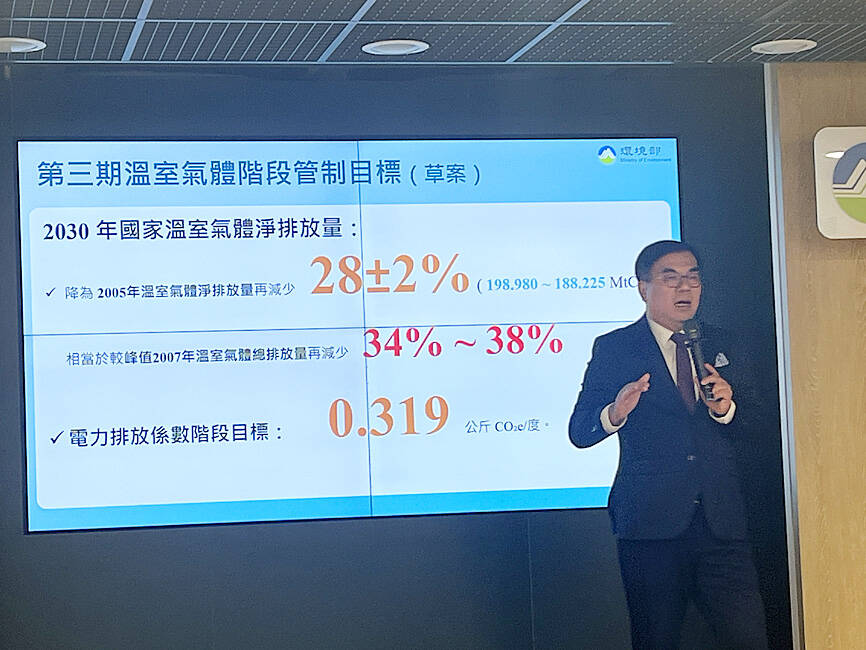The Ministry of Environment yesterday announced an updated goal of a 28 percent, plus or minus 2 percent, reduction in greenhouse gas emissions by 2030 compared with the 2005 baseline.
The ministry reviewed the national carbon reduction goals under President William Lai’s (賴清德) instructions and proposed the third phase of reduction goals in accordance with the Climate Change Response Act (氣候變遷因應法).
The proposal aims for a more ambitious goal than the one set out in “Taiwan’s Pathway to Net Zero Emissions in 2050” by the National Development Council in 2022, which was 24 percent, plus or minus-1 percent.

Photo: Chen Chia-yi, Taipei Times
The ministry also proposed a periodic goal of decreasing the electricity carbon emission factor by about 35 percent to 0.319kg carbon dioxide per kilowatt-hour by 2030, as well as other periodic regulatory goals for six major sectors — energy, manufacturing, businesses and residences, transportation, agriculture and environment.
Minister of Environment Peng Chi-ming (彭啟明) yesterday said that he is confident of achieving the reduction goal of 26 percent to 30 percent by 2030.
The tolerable range was raised to plus or minus 2 percent in light of uncertainties related to the global political and economic situation, growing concerns about climate issues, latest developments in climate technology, increased power demand from the domestic artificial intelligence industry, and the impact of an amendment to the Act Governing the Allocation of Government Revenues and Expenditures (財政收支劃分法) on the climate budget, he said.
Updated carbon reduction goals by 2032 and 2035 would be proposed at the third meeting of the Presidential Office’s National Climate Change Committee on Jan. 23, Peng said.
In related news, the ministry yesterday said that more businesses would be listed for carbon footprint verification.
About 500 companies, including department stores, convenience stores, medical centers, and railway and metro service providers would be required to verify and report their greenhouse gas emissions for the fiscal year 2025 by the end of April 2026, the ministry said.
So far they are not required to commission an independent third party to conduct the verification, nor are they required to pay a carbon fee, the ministry said.
Taiwan’s projected carbon reduction amount would be 34 percent to 36 percent by 2030 from a peak value of 279.74 megatonnes in 2007, second only to Japan’s 41 percent, while South Korea’s projected reduction would be 14 percent, the ministry said.
China would increase carbon emissions by 57 percent by 2030, it said.
Additional reporting by CNA

‘ABUSE OF POWER’: Lee Chun-yi allegedly used a Control Yuan vehicle to transport his dog to a pet grooming salon and take his wife to restaurants, media reports said Control Yuan Secretary-General Lee Chun-yi (李俊俋) resigned on Sunday night, admitting that he had misused a government vehicle, as reported by the media. Control Yuan Vice President Lee Hung-chun (李鴻鈞) yesterday apologized to the public over the issue. The watchdog body would follow up on similar accusations made by the Chinese Nationalist Party (KMT) and would investigate the alleged misuse of government vehicles by three other Control Yuan members: Su Li-chiung (蘇麗瓊), Lin Yu-jung (林郁容) and Wang Jung-chang (王榮璋), Lee Hung-chun said. Lee Chun-yi in a statement apologized for using a Control Yuan vehicle to transport his dog to a

Taiwan yesterday denied Chinese allegations that its military was behind a cyberattack on a technology company in Guangzhou, after city authorities issued warrants for 20 suspects. The Guangzhou Municipal Public Security Bureau earlier yesterday issued warrants for 20 people it identified as members of the Information, Communications and Electronic Force Command (ICEFCOM). The bureau alleged they were behind a May 20 cyberattack targeting the backend system of a self-service facility at the company. “ICEFCOM, under Taiwan’s ruling Democratic Progressive Party, directed the illegal attack,” the warrant says. The bureau placed a bounty of 10,000 yuan (US$1,392) on each of the 20 people named in

The High Court yesterday found a New Taipei City woman guilty of charges related to helping Beijing secure surrender agreements from military service members. Lee Huei-hsin (李慧馨) was sentenced to six years and eight months in prison for breaching the National Security Act (國家安全法), making illegal compacts with government employees and bribery, the court said. The verdict is final. Lee, the manager of a temple in the city’s Lujhou District (蘆洲), was accused of arranging for eight service members to make surrender pledges to the Chinese People’s Liberation Army in exchange for money, the court said. The pledges, which required them to provide identification

INDO-PACIFIC REGION: Royal Navy ships exercise the right of freedom of navigation, including in the Taiwan Strait and South China Sea, the UK’s Tony Radakin told a summit Freedom of navigation in the Indo-Pacific region is as important as it is in the English Channel, British Chief of the Defence Staff Admiral Tony Radakin said at a summit in Singapore on Saturday. The remark came as the British Royal Navy’s flagship aircraft carrier, the HMS Prince of Wales, is on an eight-month deployment to the Indo-Pacific region as head of an international carrier strike group. “Upholding the UN Convention on the Law of the Sea, and with it, the principles of the freedom of navigation, in this part of the world matters to us just as it matters in the